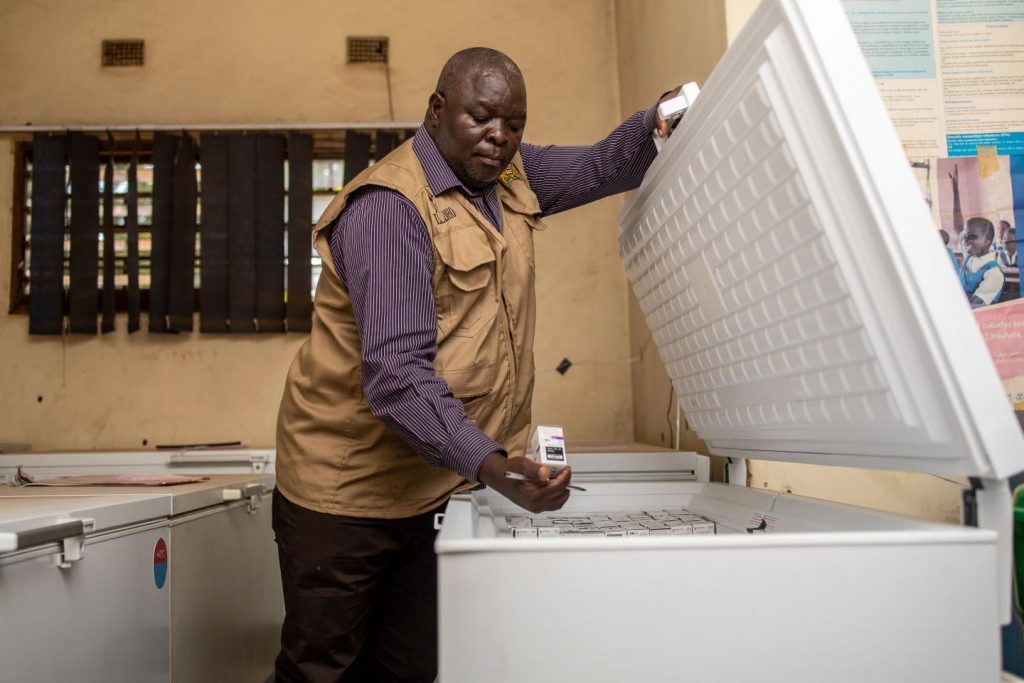Sights of blue cold boxes decked by the doorstep welcome you to the district vaccine store at Lilongwe District Health Office in Malawi’s capital.
Entering the building, noiseless vaccine refrigerators come into view and community health workers are seen filling their cool boxes for the day’s work in surrounding communities.
Nkhoma checks the state of doses at Lilongwe vaccine store
At the vaccine store, Maclean Nkhoma is hard at work.
For the district coordinator of the national Expanded Programme on Immunisation (EPI), there is little time to rest. He has to ensure that every health facility in the district of over two million people has enough vaccines and every dose reaches the recipients with full potency.
“These EPI cold chain equipment are almost everything in our urgent work to ensure everyone aged above 12 is vaccinated against the Covid-19 pandemic, which has killed over 2 600 people in the country,” he says.
Before the new refrigerators arrived, Nkhoma and his team used to rely on archaic gas-cooled fridges haunted by frequent breakdowns.
“The old refrigerators were not ideal because Covid-19 vaccines are so sensitive that they easily expire if exposed to high temperatures,” he says.
Maere collecting vaccines for distribution in Lilongwe
The cold chain workforce needs to constantly monitor the discarded fridges so that no dose goes to waste due to regular faults and fluctuating temperature.
Not anymore.
Nkhoma thanks Unicef Malawi for providing new fridges as well as cold boxes and vaccine carriers used to safely deliver vaccine doses to remote health facilities and communities.
The support funded by the Government of Japan helped the Ministry of Health to increase the cold chain storage and transportation capacity in Malawi. It also includes vaccine carriers, cold boxes, refrigerators and cold rooms. The procurement of cold rooms by Unicef is underway.
When Nkhoma reports for work at 7.30 am, he checks if the refrigerators are working and monitors the temperature of an array of vaccines so that no dose perishes before reaching the person who needs it to reduce the risk of dying or being hospitalised by Covid-19. The routine checks include tracking orders made by various health centres so that his team packs enough for each destination. As the sun rises, vehicles come and go, taking the pre-packed vaccines to communities where they are needed most and bring back empty boxes that proclaim a promise delivered.
He says the improved cooling system has transformed vaccine storage amid the overwhelming pressure to urgently deliver routine immunisation to children aged below five alongside the emergency Covid-19 and polio vaccination campaigns.
“The support is timely because most facilities in the district had old refrigerators with just enough space for routine vaccines and inadequate boxes for carrying enough doses to health centres and communities. This has helped us cope with the mounting pressure to safely store and deliver different vaccines at the same time,” says Nkhoma.
He states that the big boxes seen outside his office carry “a lot more vaccines” than the ones that were in use before the rollout of the Covid-19 vaccination campaign in May 2021.
This eases access to vaccines for the country’s rural majority which has to do with health facilities that are not only far apart but also dozens of kilometres from the vaccine stores.
“The carriers are helping us safely take vaccines close to where the people who need them live. When a vehicle speeds off to Malembo, about 95km away, it carries enough vaccines to supply the neighbouring health centres such as Ukwe, Mbavi, Nsalu, Chikowa and Nsendwe,” Nkhoma states.
At the receiving end are the health surveillance assistants (HSAs) waiting to take the vaccines to places where people live, gather or work.
Daisy Maere moved to Lilongwe in 2018, a decade after becoming an HSA. She feels relieved that the community health workers no longer scramble for few cold boxes when duty calls.
“Previously, we had few boxes for carrying vaccines during community outreach and most of them had no airtight covers. But now nearly every HSA has one. When we set off to vaccinate people in surrounding communities, we are assured that we are carrying potent vaccines and every dose will reach our clients before it expires,” Maere explains.
For HSAs like her, having cooling props at arm’s length and on-demand is almost everything to the national strategy to ensure everyone gets health services they need close to where they live without enduring financial hardship.
“The vaccine carriers have powered our new inroads to ensure people get vaccinated at home and in their communities instead of spending time and money travelling to the nearest health facilities. This means our clients are saving time they can use to take care of their families, crops and businesses,” says Maere.
She was speaking after vaccinating 57 people in Lilongwe City. Unicef supported the Covid -19 Vaccination Express campaign which helped utilise about 750 000 vaccine doses expected to expire in November and December 2021.
And Nkhoma grins: “Thanks to our partners, our clients no longer endure long walks to get the Covid-19 vaccines. We carry different vaccines close to the people and they reach them safely.”
The post Keeping vaccines chilled appeared first on The Nation Online.
 Moni Malawi
Moni Malawi 

